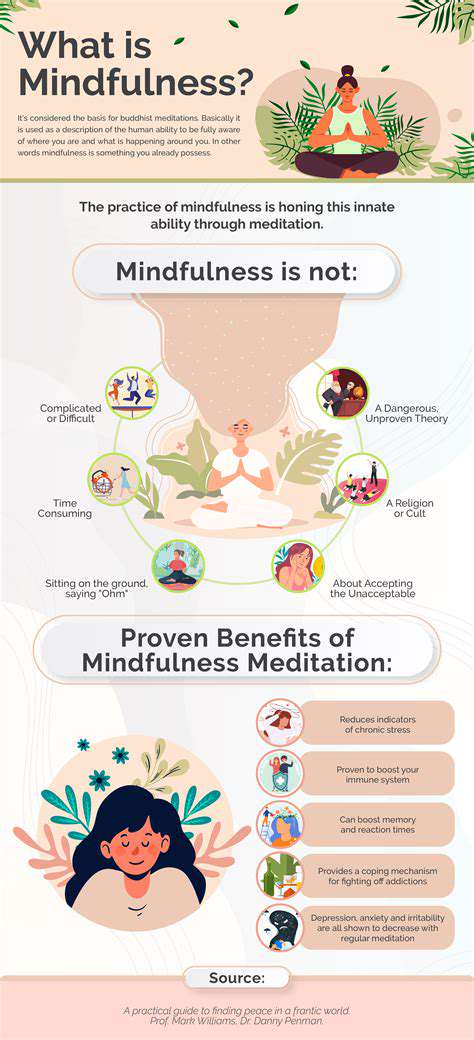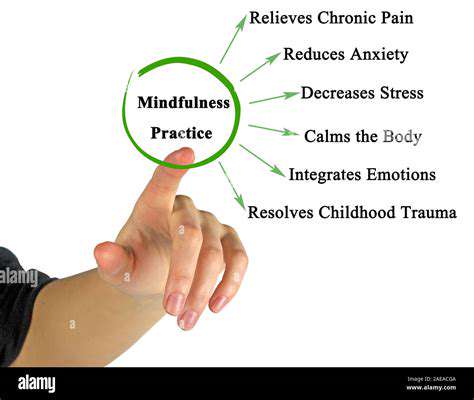Transform Your Life: How to Practice Mindfulness Daily
What is Mindfulness?

Understanding Mindfulness
Mindfulness is a mental practice that involves focusing one's awareness on the present moment. By observing thoughts and feelings without judgment, individuals can cultivate a greater sense of self-awareness and control over their emotional responses. This technique is beneficial not only for mental health but also for physical well-being.
Practicing mindfulness encourages a deep connection between mind and body. Many people find it helps in reducing stress levels and enhancing overall emotional regulation. In essence, mindfulness is about being fully engaged in the here and now.
Mindfulness can be practiced through various techniques such as meditation, breathing exercises, and even mindful walking. These practices train the mind to return to the present whenever it begins to wander, fostering a profound awareness of one’s thoughts and feelings.
Benefits of Daily Mindfulness Practice
Incorporating mindfulness into your daily routine can lead to remarkable benefits. Regular practitioners often report reduced anxiety, improved concentration, and a greater capacity for empathy. Ultimately, these benefits contribute to a more balanced and fulfilling life.
Mindfulness can also greatly enhance emotional resilience. By learning to observe feelings without becoming overwhelmed, individuals can better navigate life's challenges. This practice encourages a healthier response to stress and a more positive outlook on life.
Furthermore, studies have shown that mindfulness can lead to improved physical health, including lower blood pressure and better immune function. Thus, integrating mindfulness into your daily actions is not just about mental clarity but also about supporting overall health.
How to Begin a Mindfulness Practice
Starting a mindfulness practice does not have to be complicated. Simple techniques, such as focusing on your breath for a few minutes each day, can lay a strong foundation. Setting aside just five minutes daily can make a significant difference over time.
Another effective approach is to incorporate mindfulness into everyday activities, such as eating or walking. Paying close attention to the sensations and experiences during these tasks can transform mundane moments into opportunities for connection and awareness.
Finally, it’s essential to be patient with yourself on your mindfulness journey. Progress may be gradual, but consistency is key. Over time, as mindfulness becomes a regular part of your life, you’ll likely experience its profound effects on both your mental and physical well-being.
Benefits of Practicing Mindfulness

Improved Mental Clarity
Practicing mindfulness daily can lead to significant improvements in mental clarity. When you focus your attention on the present moment, you decrease distractions and increase your ability to concentrate.
This enhanced clarity not only aids in decision-making but also helps you respond to challenges with a clearer mind. Over time, this can result in better problem-solving skills and a more productive mindset.
Enhanced Emotional Regulation
Regular mindfulness practice can help individuals develop better emotional awareness and regulation. By paying attention to your emotions without judgment, you can learn to respond rather than react impulsively.
This can lead to healthier relationships and improved interpersonal dynamics, as you become more attuned to both your own feelings and those of others. Learning to manage emotions effectively is a crucial component of overall emotional intelligence.
Stress Reduction
One of the most celebrated benefits of mindfulness is its ability to reduce stress levels. By practicing mindfulness techniques, you can create a calm and centered mindset, even during high-pressure situations.
This practice encourages a shift away from excessive worry and anxiety, allowing for greater resilience in the face of life's challenges. Over time, reduced stress can also lead to improved physical health, as chronic stress is linked to various health issues.
Increased Self-Awareness
Mindfulness encourages a deepened sense of self-awareness, which is essential for personal growth. Through reflection and attention to your thoughts and feelings, you become more aware of your patterns of behavior.
This heightened self-awareness can lead to better life choices and a stronger connection to your values. Ultimately, understanding yourself more clearly paves the way for a more fulfilling and authentic life.
Tips for Practicing Mindfulness Daily
Start with Your Breath
One of the simplest and most effective ways to practice mindfulness is to focus on your breath. Take a few moments each day to sit in a quiet space, close your eyes, and breathe deeply. Inhale deeply through your nose, allowing your abdomen to rise, and then exhale slowly through your mouth. This practice not only calms the mind but also grounds you in the present moment.
As thoughts begin to drift, acknowledge them without judgment and gently return your focus to your breath. This act of returning your attention can serve as a powerful reminder of the importance of being present. Over time, this practice can help build your ability to remain mindful throughout various activities during the day.
Consider setting aside a specific time daily to practice this breathing technique, perhaps in the morning to start your day, or in the evening to wind down. Establishing a routine can help reinforce the habit and allow you to experience its benefits more fully.
Embrace Mindfulness in Daily Activities
Mindfulness doesn’t have to be confined to sitting in meditation; it can be incorporated into your daily activities. Whether you are eating, walking, or even washing dishes, try to bring your attention fully to the experience. For example, during meals, savor each bite and pay attention to the flavors, textures, and aromas of your food. This helps to cultivate appreciation and presence.
Similarly, when you go for a walk, take notice of the sights, sounds, and smells around you. Feel the ground beneath your feet and the rhythm of your steps. This focus on physical sensations can enhance the experience and help you connect with your surroundings in a more meaningful way.
Finally, remember that mindfulness is a practice. It may not always feel natural at first, but with regular effort, it will become easier to integrate into your daily life. The key is to approach each moment with curiosity and openness, allowing yourself to experience life more fully.
- Boosting Personal and Professional Success Through Emotional Intelligence
- The Critical Importance of Emotional Intelligence in Personal and Professional Success
- Dog grooming mistakes every owner should avoid
- The Benefits of Daily Mindfulness Practice for Stress Relief
- Embracing Mindfulness for a Balanced and Fulfilling Life
- Essential tips for cleaning your dog's ears